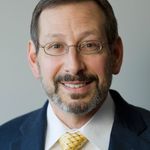Spotlight on Faculty: David Levin, Ph.D.
What brought you to Boston University?
Several aspects of Boston University prompted me to move from Johns Hopkins University. Certainly, its location in Boston is a tremendously positive factor. There is an enormous pool of bright and talented scientists in Boston. But perhaps the most important element was the high level of collaborative interaction that is part of the culture of Boston University. We have a very interactive community here, which is important for professional growth at all levels, from students to faculty.
You serve as chair of the PiBS Admissions Committee. Can you describe that experience?
The admissions process for PiBS is a great deal of work for everyone involved, but it’s very satisfying. I was amazed by the number of high quality applicants we received in the first year, which allowed us to be very selective. It was great to get to know the applicants, first on paper, then in person through the interview process. The aspect that was new to me, as the director of Admissions, was the importance of getting to know all of the applicants we chose to interview, rather than just the few with whom I had formal meetings. This was a significant challenge, but rewarding at the same time.
How does a program like PiBS benefit our PhD students?
There are several benefits to an interdisciplinary umbrella program such as PiBS, particularly for students who have not yet settled on a specific sub-discipline of biomedical science for their doctoral studies. For example, students enter the program without commitment to a specific department, or discipline. This allows them to explore a wide variety of research areas through laboratory rotations in labs spread across eight separate, but related Ph.D. programs, as well as through seminars and other events in various participating departments. Additionally, because the first year curriculum is broad-based, it puts students on a very strong footing to move in whatever direction they chose, not only for their Ph.D. research, but at later stages, as well.
Are you involved in any research at the moment?
My lab studies molecular mechanisms underlying stress signaling. We use yeast as a model system for understanding signal transduction events that are typically initiated at the cell surface and are translated into physiological responses, often through changes in gene expression. We have discovered recently a novel mechanism for control of stress-induced genes, called transcriptional attenuation. We think of this process as a mechanism to keep the control regions of these genes functioning under conditions in which gene expression is turned off, so that gene expression can be activated rapidly and efficiently under emergent conditions. There may be applications of this work to therapeutic gene silencing.
What are the most challenging and the most rewarding parts of your job?
The most rewarding aspects of my job are the research successes. Those discoveries that change the fundamental way in which we think about a process happen only rarely. But when they do, there is nothing quite like it.
How do you like to spend your time outside of BUSM?
My wife and I enjoy travel abroad and are gradually working our way through a long “bucket list”.
Do you have any advice for current students or prospective students?
The primary job of a Ph.D. student is to turn themselves into rigorous, self-critical scientists. It’s not about completing a project, or even about the number of papers you publish during your time here, although these are important aspects of becoming a scientist. If you focus on developing your ability to generate good data and to analyze those data in a critical way, this will serve you very well.